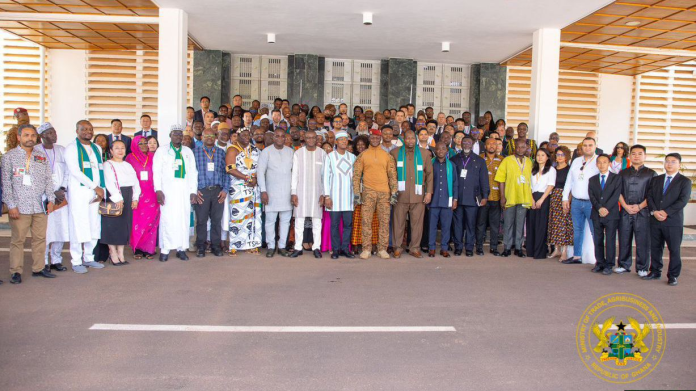Ghana’s Deputy Minister for Trade, Agribusiness, and Industry, Sampson Ahi, has urged deeper industrial cooperation with Burkina Faso, emphasizing that stronger ties between the two nations could unlock substantial economic opportunities across West Africa.
Speaking at the “Invest in Burkina Faso” forum in Ouagadougou, Ahi told government officials and business leaders that the neighboring countries must leverage their shared history and complementary economies to create jobs and drive regional growth. The event, themed “Structural Investments for a Sovereign Burkina Faso,” drew investors keen on exploring cross-border partnerships.
Trade between the two nations reached approximately US$300 million in 2024, with Ghana exporting processed foods, pharmaceuticals, and cocoa derivatives while importing cotton, textiles, and shea butter from Burkina Faso. Yet Ahi believes there’s room for much more, particularly in sectors where each country’s strengths align naturally.
“Ghana and Burkina Faso not only share a border but also a deep history of friendship, cultural exchange, and a common vision for a prosperous and united West Africa,” Ahi said during the bilateral meeting with Burkina Faso’s Industry Minister, Donatien Nagalo.
The deputy minister outlined several areas ripe for collaboration. Burkina Faso’s robust cotton production, for instance, could feed Ghana’s textile mills, while its tomato and vegetable harvests might supply Ghana’s expanding food processing sector. These aren’t just theoretical possibilities; they’re practical ventures that could materialize if both governments commit to streamlining cross-border operations.
Infrastructure emerged as a critical talking point. The Tema to Ouagadougou trade corridor, currently plagued by delays and high transportation costs, needs significant upgrades. Better dry ports and warehousing facilities would make trade faster and cheaper, Ahi argued, while energy integration projects could provide the reliable power both nations need for industrial expansion.
Ghana has been rolling out policies designed to attract investment and boost manufacturing competitiveness. Programs like Feed the Industry and the Agribusiness Development and Value Extension Programme aim to ensure consistent raw material supplies for processors. Meanwhile, initiatives such as MAKE24 and BUILD24 focus on industrial productivity improvements.
The government has also introduced sector-specific policies covering textiles, pharmaceuticals, and automotive components, offering incentives that Ahi says should appeal to Burkinabé entrepreneurs looking for joint venture opportunities.
To move beyond talk, Ahi proposed establishing a Joint Investment Facilitation Desk that would help investors navigate bureaucratic hurdles more efficiently. He also suggested identifying specific pilot projects in cotton processing, logistics, and renewable energy within the next six months, creating measurable benchmarks for progress.
Quality standards matter too, especially as both countries prepare to tap into opportunities under the African Continental Free Trade Area. Products need to meet international certification requirements if they’re going to compete effectively in regional and global markets.
The forum, organized by Burkina Faso’s Ministry of Industry, Trade and Craft and attended by Head of State Captain Ibrahim Traoré, provided a platform for exploring these ideas in concrete terms. For Ghana, participation signals its broader commitment to regional integration and its determination to help Ghanaian businesses expand throughout West Africa.
What’s clear from Ahi’s message is that both nations expect results, not just dialogue. The frameworks exist, the potential is evident, and the political will appears present. Now comes the harder part: turning agreements into functioning enterprises that actually create jobs and generate wealth for ordinary citizens in both countries.
Source: newsghana.com.gh











